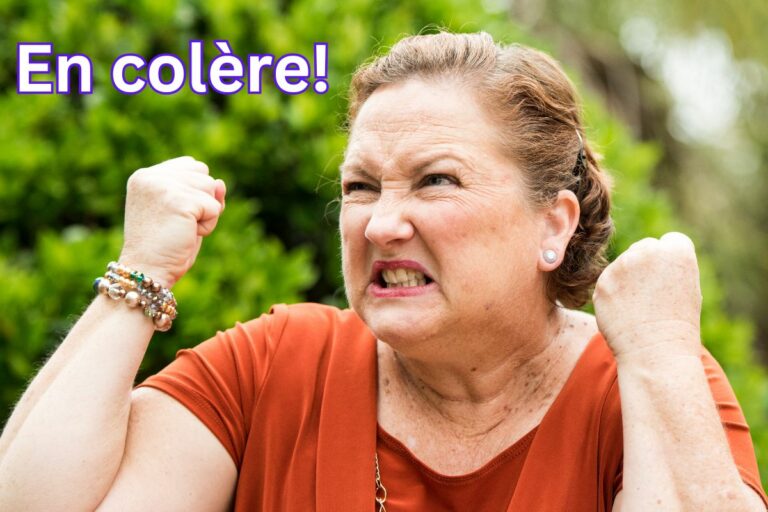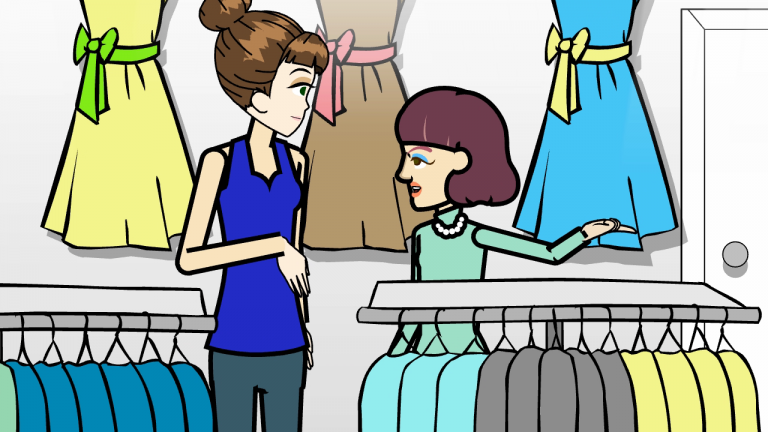How To Talk About Yourself in French (many audio examples)
Talking about yourself in French can be fun if you're hanging out with French speaking friends, students or co-workers.
The situations of life in which you need to present yourself are countless : school, job interviews, professional meetings, administrative stuff, social encounters, dating ...
Introducing yourself in French, that is, saying out your name, age, home country, occupation etc, is not so different than in your native language.
Where things start to differ from culture to culture, is what you actually choose to say about yourself as a French speaker. And of course the way you choose to say it.
For example, French people often find it unpleasant when a person is talking about him/herself in a self-confident way, which they often consider as bragging. E.g, talking openly about your qualities or achievements.
In this article, we hear Fred, a French guy, talking about himself, perhaps recording a quick presentation video for a social website. After hearing the presentation, we comment the spoken French phrases and expressions he's using.
Here's Fred's presentation :
Salut, moi c'est Fred, j'ai 36 ans, je suis de Toulouse, diplômé d'une école de commerce.
Je suis commercial chez un concessionnaire auto.
Je suis du genre extraverti, sociable, j'adore les contacts.
Mon trip à moi, c'est de sortir, m'amuser, mater le foot avec les potes, délirer avec les filles...
Je suis quelqu'un de cool, je n'aime pas me prendre la tête. Je laisse couler !
Je suis célibataire. j'ai été avec quelqu'un pendant deux ans, mais ça n'a pas marché.
Je ne supportais plus ses reproches, pourquoi tu fais ci, pourquoi tu fais pas ça ...
Sur mon lieu de travail, je vois souvent passer de jolis petits lots... Et sur Facebook aussi.
Mon job, c'est pas ma vie. Je fais mon boulot, je ne cherche pas midi à 14h.
Mon chef est du genre chicaneur, alors que moi je suis plutôt zen.
Je n'aime pas trop les objectifs, les évaluations, et les patrons prise de tête.
Je ne suis pas non plus très fan des clients qui posent des tonnes de questions !
Listen to the audio :
And here's the English version :
Hey, Fred here, 36, from Toulouse, business school graduate.
I work as a salesman at a car dealership.
I'm the extraverted type, social guy, I love contacts.
I get kicks from going out, having fun, watching soccer with my boys, hanging out with the girls...
I'm a mellow person, don't like to complicate things. I just let things roll.
I'm single. I was involved with someone for two years, but it didn't work out.
Could no longer stand her complaints, why are you doing this, why don't you do that ...
In my workplace I see some hot little numbers go by ... And on Facebook as well.
My job is not my life. I do my work, I try not to complicate things too much.
My boss is kind of a nitpicker, whereas I'm more of an easy-going person.
I'm not crazy about sales quotas, evaluations, and picky managers.
Nor am I a big fan of customers who ask tons of questions !
Talking about yourself in French : who you are, basic information
Fred starts his talk by introducing himself : his name, his age, his home town, his education.
For his name, he uses the phrase :
"Salut, moi c'est Fred"
This is a colloquial way in French to introduce oneself, a bit like saying "Hey, Fred here !" When talking about yourself, you would only use "Moi c'est ..." in very informal and relaxed situations, e.g. a friend circle. Otherwise, you would use a more classic :
"Je m'appelle Fred" or "Mon nom est Fred"
For his age, he could have gone on using an informal style by omitting "j'ai" :
"Salut, moi c'est Fred, 36 ans ..." (I'm Fred, 36.)
He says "je suis de Toulouse", I'm from Toulouse. Other ways he could have said it include :
"Je viens de Toulouse" (I come from Toulouse)
or "Je suis toulousain" (I'm a "Toulousan")
He then adds :
"diplômé d'une école de commerce" (I have a degree from a business school)
Note he omits "je suis" this time. It's worth noting that the French are highly averse to repeating words - word repetition is considered a very bad thing in French. French speakers always look for alternative words or phrases to avoid repetition, even if that affects the clarity of the sentence.
For example, in a news report in French about the president of the United States, the journalist will say "the President of the United States" once, but will then refer to him as "the tenant of the White House", or other similar contrived phrases .
Here, the offending phrase would be "je suis", which was already used in "je suis de Toulouse".
There are lots of "ecoles de commerce" (business / management schools) all over France, from small, less competitive ones, to top prestigious schools such as H.E.C. and INSEAD. Business and Engineering are two of the most common degrees college graduates earn.
Fred goes on saying :
"Je suis commercial chez un concessionnaire auto".
When talking about yourself and your occupation in French, you typically use the construct "être + occupation" :
"Je suis entrepreneur" (I'm an entrepreneur)
"Elle est boulangère" (she's a baker)
"Il est jardinier" (he's a gardener)
Click here for more examples on discussing your occupation at a cocktail party.
Note he uses the phrase "concessionnaire auto" ( car dealership). Native French speakers love to shorten words in everyday spoken French, here "concessionnaire auto" is short for "concessionnaire automobile".
Click here for more word shortening examples in spoken French.
Talking about yourself in French : your personality and tastes
Referring to himself, he says :
"Je suis du genre extraverti" (I'm the extraverted kind)
"Etre du genre" is frequently used in spoken French when talking about yourself or someone else, to mean being of a certain type :
"Je suis du genre poli" : I'm the polite type
"Elle est du genre timide" : she's a shy kind of girl
"Ils sont du genre stressé" : they are the stressed out kind
We also use "je suis plutôt + adjective" for a similar meaning :
"Je suis plutôt calme (comme garçon)" : I'm more of a quiet boy
Or, combining the two constructs, you can say :
"Il est plutôt du genre nerveux !" (he's more of the nervous type)
The phrase "j'adore les contacts" is commonly used in French to mean "I love social interactions" - an important aspect of a person's personality, both in the personal or professional realm.
Fred then starts a sentence with :
"mon trip, c'est ..."
This is a colloquial French phrase to say : the things that I like, the things that make me tick, my thing is. A phrase you may often employ when talking about yourself :
"Son trip c'est le sport !" (sports are what makes her tick)
"C'est quoi ton trip dans la vie ?" (what's your thing in life ? What do you like ?)
"Moi, mon trip, c'est la danse" (danse is my thing)
Fred is a party guy, likes to go out and have fun :
"Sortir, m'amuser" (go out, have fun)
Another way to say "sortir" is "faire la fête" (to party) :
"J'adore faire la fête !"
He could have used "s'éclater" instead of "s'amuser" :
"J'aime m'éclater" (I like to have fun, have a ball)
As he talks about himself and the things he likes to do, he says :
"Mon trip, c'est de mater le foot avec les potes"
The verb "mater" is a very colloquial, even slanguy French word for "to watch". It's often used in slang to mean "check out", often in the context of checking out girls / guys :
"Il n'arrête pas de mater les filles" (he keeps checking out the girls)
"Arrête de mater !" (stop staring !)
In our dialogue, there's no sexual connotation, but using the verb "mater" sounds cooler and more relaxed, a reference to the population that most frequently uses these words, i.e. the "cool and tough" youth population in rough city areas.
French speakers frequently say :
"On va mater un film ?" (shall we watch a movie ?)
or "on va se mater un film ?"
"On mate un petit match de tennis" (we're watching a tennis game for a little while)
Fred likes to watch soccer games with his friends :
"avec les potes"
The word "pote" is another colloquial French term for friends, buddies, pals :
"Je vais au restau avec un pote" (I'm going to the restaurant with a buddy)
"Avec des potes on part en Grèce" (with my buddies we're going to Greece)
Saying "avec les potes" (vs. "avec mes potes") is like saying "with the boys", or if it's a woman speaking, "with the girls", suggesting your everyday friends.
He also says "délirer avec les filles", which in French literally means talking crazy with the girls, talk nonsense, babble, rave. The expression "délirer" normally refers to being delirious, but is often used in spoken French to mean hanging out and talking about fun stuff.
So here, "délirer avec les filles" really means "hanging out with the girls".
Other examples :
"On s'est posé et on a déliré pendant deux heures" (we hung our and talked about fun stuff for 2 hours)
"On a bien déliré à propos de musique" (we talked away about music)
"On s'est fait un délire toute la soirée" (we talked about fun stuff all evening)
The phrase "se faire un délire" is often used instead of just "délirer".
Fred then says :
"Je suis quelqu'un de cool"
French speakers often use "je suis quelqu'un (de, qui)" when talking about themselves, referring to themselves in the third person. For example, you may talk about yourself saying :
"Je suis quelqu'un de très patient" (I'm a very patient person)
"C'est quelqu'un de très ponctuel" (she's a very puntual person)
"je suis quelqu'un qui n'aime pas les disputes (I don't like arguments)
French people are often keen on being modest, and quite averse to what they see as bragging. So, when talking about yourself, using "je suis quelqu'un de (+ adjective)" will often be perceived as more pleasant than "je suis (+ adjective)", because it's a more indirect way of referring to your own self : you're NOT the center of the universe !
Click here for more about why you need to be modest in French.
Fred also adds :
"Je n'aime pas me prendre la tête."
In colloquial spoken French, the phrase "se prendre la tête", possibly a reference to the gesture of holding your head when dealing with a complex issue, is a very colloquial expression for saying : to make simple things more complicated than they are, or to worry about things too much.
So Fred is saying he doesn't like to complicate his life by worrying about things unuyly. In other words, he lets things slide.
"je laisse couler" (I let things slide, flow, I don't get hung up about anything)
Note that "se prendre la tête avec quelqu'un" means to have an argument, a quarrel, with someone.
Talking about yourself in French : your love life
He then goes on to talk about his love life. He's currently single, but hasn't always been :
"j'ai été avec quelqu'un pendant deux ans" (I was with someone for 2 years)
When talking about yourself and your relationship status in French, you typically use "être avec" for being in a relationship :
"Je suis avec une française en ce moment" (I'm dating / going out with a French woman these days)
"Je suis avec quelqu'un depuis longtemps" (I've been in a relationship for a long time)
Note how "être avec" translates literally to "to be with" in English, which has a similar meaning. To clearly express the notion of a relationship, you typically add an element of time in the sentence ("depuis longtemps").
Fred doesn't say "depuis deux ans" but "pendant deux ans", because his relationship has already ended - another cue is his use of "j'ai été" (passé composé).
He then adds "mais ça n'a pas marché" (it didn't work out)
The phrase "ça marche" (and "ça marche pas") is extremely common in everydat colloquial French. You use "ça marche / ça a marché" (or negative) to express that something succeeded or failed :
"Ça a marché tes exams ?" (did your exams work out well ?) Note the shortened word "exam", normally "examen".
"Ça marche le boulot ?" (is your work going well ?)
"J'ai posé ma candidature mais ça n'a pas marché" (I applied but it didn't work out)
Note that it's particularly common in French to use "ça n'a pas marché" when referring to a relationship.
In everyday spoken French, you'll also hear the phrase "ça marche" used for "OK", "sure", "deal", or "see ya" :
"On se voit demain ?" "Ça marche !" (shall we meet tomorrow ? Sure)
"Bon à plus tard !" "Ça marche !" (see you later ! See you)
Fred then explains why his relationship ended :
"Je ne supportais plus ses reproches"
The verb "supporter" in French typically means to stand, to bear, to put up with :
"Je dois te supporter toute la journée" (I have to put up with you all day)
"J'ai du mal à supporter cette situation" (I have trouble putting up with this situation)
"Je ne la supporte pas !" (I can't stand her)
Fred can't stand his girlfriend's constant complains, accusations : "reproches"
"Tu me fais beaucoup de reproches" (you blame me for / blame me for too many things)
"Il te reproche de ne pas l'écouter" (he blames you for not listening to him)
He gives an illustration of his girlfriend's nagging :
"pourquoi tu fais ci, pourquoi tu fais pas ça ..." (why do you do this, why don't you do that)
Fred goes on to explains how he meets women as a single guy, including at work :
"Sur mon lieu de travail"
This French phrase is commonly used to refer to the place where you work. It's typically an office space or a public place such as a restaurant, but it can be something else, for example if you work outdoors.
In Fred's case, he's referring to the car showroom where he works as a sales person.
"Je vois souvent passer de jolis petits lots"
The French phrase "joli petit lot" refers to a pretty girl, an expression that brings up images of a petite, neat-looking and well-dressed woman seeking to purchase a new vehicle.
Stronger French expressions to designate a hot looking girl include :
"une pin-up" (old fashion)
"un canon"
"une bombe"
"une beauté" (a beauty)
"un bonnasse" (a hottie, vulgar)
He uses the phrase "je vois passer", meaning"I see them walk by". So while Fred is standing in the showroom waiting for customers to walk in, he watches pretty girls as they look around and check out the cars for sale.
He also checks out pretty girls on social networks. Judging from his talk, one may believe Fred is a real lady-killer, seducing women all day both offline and online...
Talking about yourself in French : work life
Fred goes back to his self-description, saying his job is not the center of his life :
"Mon job, c'est pas ma vie."
He could have said alternatively "ma vie c'est, pas mon job". That is, he has a life outside of work, work is actually not that important.
The French phrase :
"je fais mon boulot" (I do my job)
is often used by public-sector employees (fonctionnaires) or people with low motivation at work. It's a bit like saying "I do what I have to do, what they pay me for".
This idea is further confirmed by the phrase that follows :
"je ne cherche pas midi à 14 heures"
This French expression literally means "I don't look for noon at 2 oclock", possibly referring to the position of the hands of a clock. Common English translations of this expression include :
"I don't overthink things"
"I don't make a mountain out of a mole hill"
French speakers commonly say, in everyday life :
"Il ne faut pas chercher midi à quatorze heures"
that is, there's no need to look for complicated things, this matter is simpler than it looks.
For example, someone you know is looking upset, and you're wondering if you've said or done something wrong. You talk to a common friend about it, and he says :
"Elle est juste fatiguée, il ne faut pas chercher midi à 14 heures" (she's just tired, don't work your brain too much trying to figure out what's wrong)
Talking about his boss, Fred says ".
"mon chef est du genre chicaneur" (my boss is the nitpicking kind)
In French, the verb "chicaner" means to nibble / quibble :
"On ne va pas chicaner pour quelques centimes !" (we're not going to quibble over a few cents)
Note that in Canadian French (Québec), "chicaner" is used in a different way and means arguing, quarreling.
In contrast to his boss, Fred says he's a mellow kind of guy :
"Je suis plutôt zen"
French speakers use the word "zen" a lot when referring to a relaxed, serene person or situation :
"Elle est très zen" (she's very calm, serene, collected)
"c'est plutôt zen ici !" (this place is quite calm, relaxed)
Fred adds "... alors que moi je suis zen". When talking about yourself in French, you can use the the phrase "alors que moi" (whereas I ...) to highlight a contrast with someone else :
"Il a les yeux bleus, alors que moi j'ai les yeux marrons" (he has blue eyes whereas I have brown eyes)
Fred then says :
"Je n'aime pas trop les objectifs, les évaluations, ni les patrons prise de tête."
The phrase "je n'aime pas trop" is very frequently used in colloquial French conversation. We typically mean "I don't like", but in French saying "je n'aime pas" is considered a strong statement which can be unpleasant to the listener.
In general, French speakers use "pas trop" a lot to mitigate their negative statements :
"Je n'aime pas trop les fruits" (I don't like fruits)
"Elle n'a pas trop la forme" (she's not in good shape)
"On ne regarde pas trop la télé" (we don't watch TV)
Of course, there are cases where "pas trop" actually means "not too much", but if you've been around French people for long enough, you probably noticed it's often used as a way to damper negative statements.
In Fred's case, he's clearly saying he does NOT like sales objectives, evals and picky managers. We can even safely say he actually HATES those things.
Notice the phrase "les patrons prise de tête". It's a very colloquial French phrase related to the phrase "se prendre la tête", which as we saw earlier, means to make things complicated, to worry a lot about small things.
So "prise de tête" is used as an adjective to refer to someone who "prend la tête", that is someone who is a pain, who creates complication and stress to others (as opposed to self for "se prendre la tête").
"Ce type est vraiment prise de tête !" (this guy is really a pain) = "il me prend la tête" (he stresses me out, makes me anxious)
Fred says :
"Je ne suis pas non plus très fan des clients qui posent des tonnes de questions !"
The French phrase "je ne suis pas fan de" (I'm not a fan of) is another way of saying "je n'aime pas trop", which in turn typically means "je n'aime pas" :
"Je ne suis pas fan de la nourriture asiatique" (I'm not a fan of Asian food)
"Je ne suis pas très fan de la musique classique" (I'm not crazy about classical music)
Fred is not a big fan of clients who ask tons of questions. The colloquial French phrase "des tonnes de" is similar to the English "tons of" :
"Il n'a pas des tonnes de fric" (he doesn't have tons of money - "fric" is slang)
"Il y a des tonnes de rochers" (there are tons of rocks)
"On n'a pas des tonnes de possibilités" (we don't have tons of options)
An alternative phrase you can use for "des tonnes de" is "des tas de" :
"Il y a des tas de gens qui font pareil" (there are tons of people who do the same)
Wrapping up
I hope what you've learned through Fred's self-presentation will be helpful to you the next time you need to talk about yourself in French.
I also hope you are more a professional worker than Fred is ... But even if you are, ne vous prenez pas trop la tête ! Ne cherchez pas toujours midi à quatorze heures.
If you liked this article, leave me a comment below ! And please share it with your friends using the buttons below the comments.
Until next time !









Great Article!
Again, there are so many informal, colloquial phrases in it that are just
not taught in schools and institutions. For example, “c’est mon trip” was something I’ve heard when among French friends but did not really know what it meant!
Now I do 🙂
Also found it interesting just how much French speakers hate repetition with such a passion!